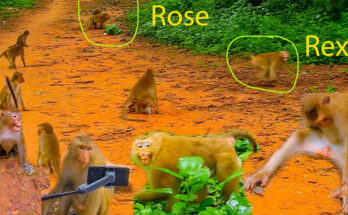Baby is Smart, Adorable, and Very Intelligent
From the moment little Noah opened his eyes to the world, his parents knew there was something special about him. His bright, curious gaze followed every movement, as if he were already analyzing the world around him. Most newborns spent their early days sleeping, but Noah seemed more interested in exploring, absorbing every sound, color, and shape.
As the weeks passed, it became clear that Noah wasn’t just any ordinary baby. At just three months old, he responded to his name, turning his head with an excited giggle whenever his mother or father called him. By four months, he had figured out how to grab his rattle and shake it with a purpose, watching with fascination as it made noise. Unlike other babies who cried aimlessly, Noah’s expressions were thoughtful—almost as if he was trying to solve a puzzle before he even knew what puzzles were.
At six months, Noah’s intelligence shone even brighter. Most babies his age babbled without meaning, but Noah seemed to imitate the tone and rhythm of speech. His parents would talk to him, and he would respond with little sounds that eerily mimicked their voices. His father, Mark, laughed one evening and said, “This boy is going to start talking before he crawls.”
He wasn’t entirely wrong.
One evening, as Noah sat playing with his favorite stuffed giraffe, he looked up at his mother, Sarah, and made a sound that wasn’t just babbling. “Ba…ba,” he said, his tiny voice filled with effort.
Sarah gasped. “Mark! Did you hear that?”
Mark rushed over. “What? What did he say?”
“Say it again, baby,” Sarah encouraged, her heart pounding.
Noah stared at her, as if processing her request, then repeated, “Ba…ba!”
Tears welled in Sarah’s eyes. “He’s trying to say ‘Mama’ or ‘Papa’!”
At only six months, Noah was already forming words. His doctor was astonished at his rapid development. “He’s ahead of the curve,” the doctor said during their next visit. “He’s showing signs of high intelligence.”
By ten months, Noah had taken his first steps. It wasn’t the unsteady wobble of most babies learning to walk—it was a determined, almost calculated effort. He placed one foot in front of the other, balancing himself with impressive control before taking another careful step. He clapped for himself when he succeeded, his tiny face lighting up with joy.
But it wasn’t just his physical milestones that amazed everyone—it was his ability to understand things. At eleven months, he could already recognize objects and point to them when asked. “Noah, where’s the ball?” his father would ask, and Noah would crawl to his little red ball and pick it up with pride. If Sarah showed him a book, he would eagerly flip through the pages, pointing at the pictures as if he understood the story.
His intelligence wasn’t just about learning quickly—it was about how he observed everything. He noticed the tiniest details, like the way a spoon reflected light or how the cat’s tail twitched when she was annoyed. His deep blue eyes were always filled with curiosity, taking in the world with an intensity far beyond his years.
By the time his first birthday arrived, Noah was already speaking a handful of words. “Mama,” “Dada,” “ball,” and “cat” were some of his favorites. He could stack blocks with precision, fit shapes into the correct slots, and even imitate simple actions like waving goodbye or clapping to music.
Friends and family were amazed. “He’s not just smart—he’s really smart,” his grandmother said proudly.
Sarah and Mark knew they had a special child, one who would continue to surprise them at every stage of his life. Noah was not just adorable—he was intelligent beyond his years, a little explorer eager to understand everything around him.


